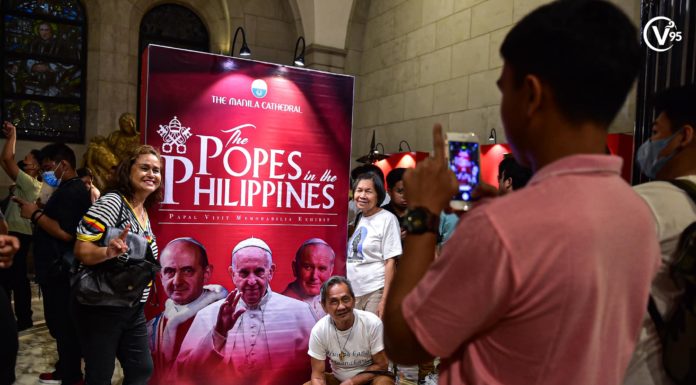UST PATRON St. Thomas Aquinas plays the major role in the University’s aim to be the Center of Contextualized Theology in Asia.
According to Joel Sagut, assistant to the director of the John Paul II (JPII) Center for Ecclesiastical Sciences, Aquinas is an authority in religious studies even in “local theology,” which deals with how God is seen in Filipino culture.
“Aquinas is a firm foundation for theology,” Sagut told the Varsitarian. “Standing by the teachings of Aquinas, the University can produce more Filipino scholars, who can substantiate theology in modern times.”
In 2005, the JPII Center for Ecclesiastical Sciences, which was named after Pope John Paul II, was formed to research on and develop philosophy, canon law, and theology in the country. The center originated from the Center for Applied Ethics that was sanctioned in 2002 through the intellectual mission of the Dominicans in Asia, which was based on the mandate of the 1998 Bologna General Chapter of the Dominicans and the 7th Provincial Chapter of the Dominican Province of the Philippines, recommending that UST train personnel and establish centers for inter-religious dialogue.
At present, the center is working on a project, attempting to discern the cultural reception of God in the Philippines.
Among the works of Aquinas considered to be of great importance in the study of theology are the Summa Contra Gentiles and the Summa Theologica, which is considered as the greatest philosophical writing of the medieval period.
Even during his time, Aquinas already was acclaimed by his contemporaries St. Albert the Great, Siger of Brabant, and Roger Bacon.
However, since Aquinas integrated Aristotelian philosophy (the main feature of Arab philosophy) in his syntheses, his works were included in the censures of 1277 promulgated by Bishop Stephen Tempier. Disputes against the “orthodoxy” of Aquinas only vanished after his canonization on July 18, 1323.
Aquinas then on received continuous praises and recommendations from the Church.
Aquinas was proclaimed “Doctor of the Church” by Pope Pius V on April 11, 1567. Also, Pope Pius X declared Aquinas as the “Angelic Doctor” in his Motu proprio in 1914.
One of the latest recognitions of Aquinas is the encyclical Fides et Ratio of Pope John Paul II.
“The Church’s Magisterium has seen and recognized his passion for truth; and, precisely because it stays consistently within the horizon of universal, objective and transcendent truth,” the Pope said.
Aquinas in UST
The Department of Philosophy of the UST Faculty of Arts and Letters, which is a Center of Excellence in the Philippines, considers Thomistic Philosophy as a safeguard in entering the realm of philosophy.
Department coordinator for Philosophy Prof. Emerito Gonzales said that UST is the bedrock of Thomism in the Philippines.
“Although some call us ‘old school,’ UST still takes pride in studying the philosophy of Aquinas,” Gonzales told the Varsitarian. “The philosophy of Aquinas may have been centuries old, however, it still finds its significance today.”
Generally, the paradigm of Aquinas is not limited to Philosophy students and aspiring priests. In fact, it is one of the three inspirations held by UST as inspirations for Thomasians. The other two are the inspiration from St. Dominic, founder of the Order of Preachers, and the long glorious history of the University as an educational institution.
“The moral teachings of Thomism cuts across all programs,” Gonzales added.
Honoring the patron
To observe the feast of Aquinas, UST held the Triduum Masses last January 23 to 25 at the Santissimo Rosario Parish. The three-day event included prayers and Masses dedicated to the saint.
According to Fr. Ramon Salibay, O.P., director of the Center for Campus Ministry, the event gave Thomasians an opportunity to commemorate Aquinas.
“The Triduum was generally meant to give due respect and honor to St. Thomas Aquinas, who is the patron saint of the University,” Salibay told the Varsitarian. “Each day of the event had a feature of our patron to reflect on.”
The Triduum presented Aquinas in three aspects–devotee of truth, patron to students, and chaste lover of God.
The last day of the event was highlighted by a procession and a concelebrated Mass with UST Acting Rector Fr. Rolando de la Rosa, O.P. as main celebrant.
Although many students and professors attended the concluding procession and Mass for the University patron, Salibay said that participation is still minimal if the population of UST will be considered.
“Sometimes Thomasians use their time more on extra-curricular events rather than religious activities,” Salibay told the Varsitarian. “I would like to see students join liturgical activities with devotion and attention.”















